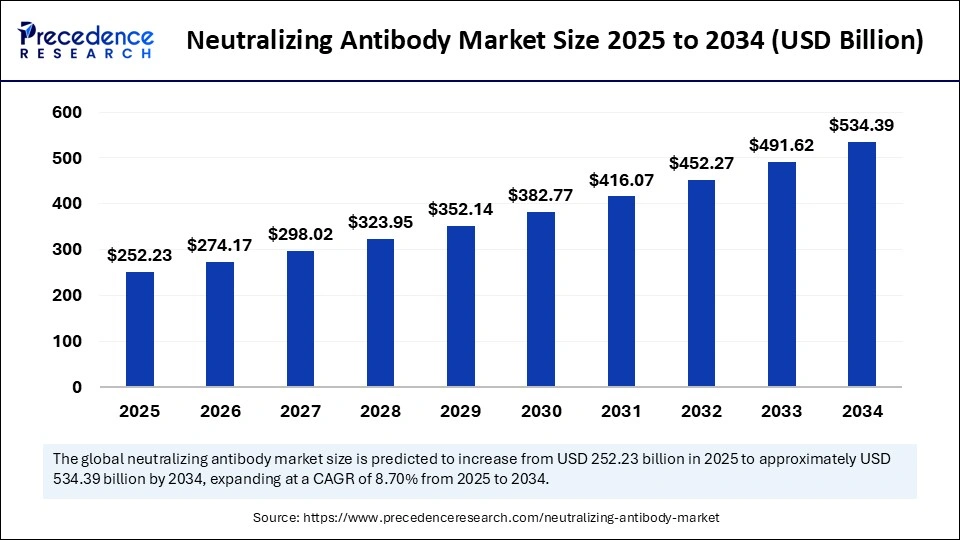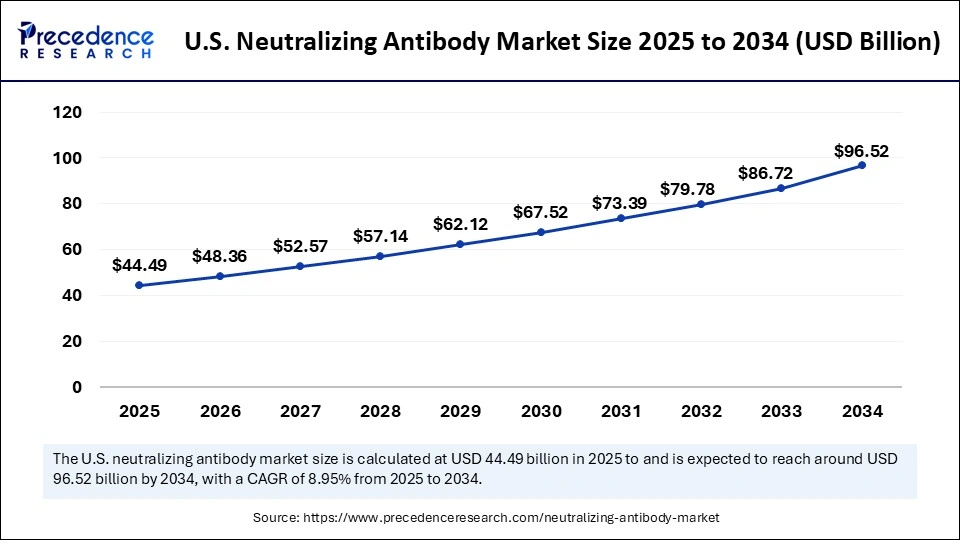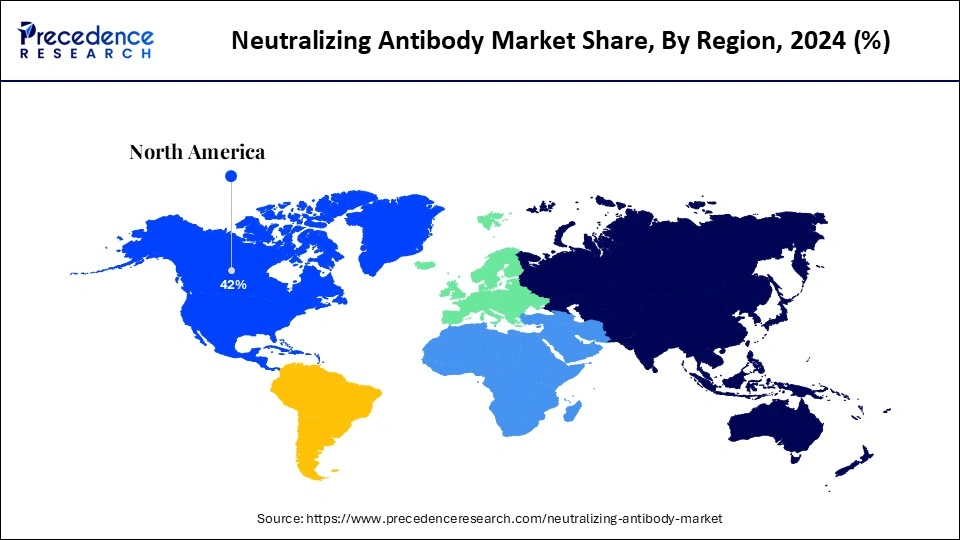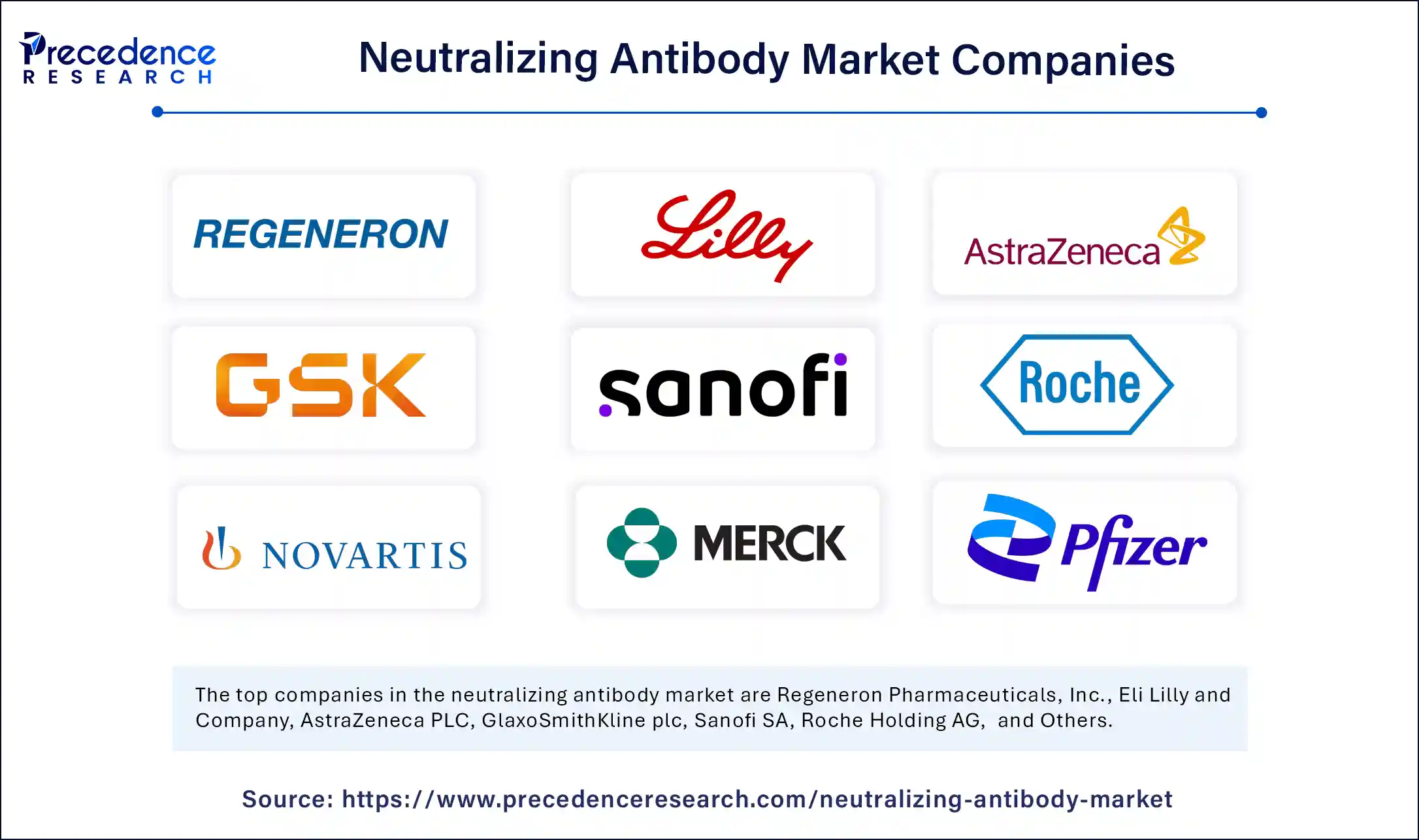Neutralizing Antibody Market Size and Forecast 2025 to 2034
The global neutralizing antibody market size accounted for USD 232.04 billion in 2024 and is predicted to increase from USD 252.23 billion in 2025 to approximately USD 534.39 billion by 2034, expanding at a CAGR of 8.70% from 2025 to 2034. The market growth is attributed to the increasing prevalence of infectious diseases. Advancements in monoclonal and polyclonal antibody development techniques and rising demand for personalized therapies further drive the market's growth.

Neutralizing Antibody Market Key Takeaways
- In terms of revenue, the neutralizing antibody market is valued at $252.23 billion in 2025.
- It is projected to reach $534.39 billion by 2034.
- The market is expected to grow at a CAGR of 8.70% from 2025 to 2034.
- North America dominated the neutralizing antibody market in 2024.
- Asia Pacific is anticipated to grow at the fastest rate in the market during the forecast period.
- By antibody type, the monoclonal antibodies segment held a significant share of the market in 2024.
- By antibody type, the polyclonal antibodies segment is observed to be the fastest-growing segment during the forecast period.
- By target virus, the influenza segment dominated the market with the highest share in 2024.
- By target virus, the SARS-CoV-2 (COVID-19) segment is seen to grow at the fastest rate in the upcoming period.
- By application, the therapeutics segment held the dominant share of the market in 2024.
- By application, the research & development segment projected to expand rapidly in the coming years.
- By end user, the hospitals & clinics segment led the market in 2024.
- By end user, the research institutes segment is expected to witness the fastest growth during the projected timeframe.
How does Artificial Intelligence Impact the Neutralizing Antibody Market
Artificial intelligence (AI) is transforming the market for neutralizing antibody by speeding up drug discovery and enhancing the accuracy of antibody design. AI models, especially machine learning, facilitate quick antibody identification, enhance antibody characteristics, mitigate risks in drug development, and lower expenses. Essential functions encompass epitope and paratope forecasting, antibody structure forecasting, antibody enhancement, antibody-drug conjugate creation, and co-design of antibody sequences and structures. Moreover, AI helps identify targets for neutralizing antibodies by analyzing biological pathways.
- In January 2025, the AI-powered platform of Lantern Pharma detected 82 promising antibody-drug conjugate (ADC) targets and 290 target-indication combinations, showcasing the potential to enhance precision and efficiency in cancer therapies.
U.S. Neutralizing Antibody Market Size and Growth 2025 to 2034
The U.S. neutralizing antibody market size was exhibited at USD 40.93 billion in 2024 and is projected to be worth around USD 96.52 billion by 2034, growing at a CAGR of 8.95% from 2025 to 2034.

North America dominated the neutralizing antibody market by holding more than 42% of market share in 2024. This is mainly due to its robust healthcare infrastructure, high prevalence of chronic diseases, technological breakthroughs, and favorable regulatory environment. The U.S. Food and Drug Administration has expedited monoclonal antibody approvals, allowing them to be commercialized more quickly. Strategic alliances among pharmaceutical companies, biotech firms, and research institutes speed up invention and access to new medications. The region is home to some of the leading biopharmaceutical companies, boosting the production of antibodies.
The U.S. leads the North American neutralizing antibody market due to its strong research and development infrastructure, regulatory backing, and high prevalence of chronic diseases. Leading biotechnology and pharmaceutical companies in the U.S., including Regeneron, Pfizer, Amgen, and Eli Lilly, are pioneers in creating neutralizing antibody therapeutics. The country has also made significant investments in the last few years in the development of neutralizing antibodies, bolstering the growth of the market.
- In November 2024, the National Institute for Innovation in Manufacturing Biopharmaceuticals (NIIMBL) announced a strategic action plan aimed at enhancing the flexibility of antibody manufacturing, allowing for rapid responses to health emergencies while ensuring the ongoing supply of current therapies, thus bolstering the ability of the region to address health threats.

Asia Pacific is anticipated to grow at the fastest rate in the market during the forecast period. This is mainly due to the rising investments in biotechnology research and innovation. The increase in infectious diseases, especially COVID-19, has raised the need for neutralizing antibody-based treatment options. The rapid expansion of biotech firms, research universities, and pharmaceutical companies is expediting the creation of new treatments. Rising emphasis on novel drug discovery and development, and rising approvals are driving the growth of the market in the region.
China plays a major role in the market. The rising government investment in research and development of monoclonal antibodies and the increasing prevalence of infectious diseases, such as COVID-19, are driving the growth of the market. Chinese biotechnology firms such as Sinovac and CanSino Biologics have created neutralizing antibodies for pandemic preparedness. Recently, Brii Biosciences, a Chinese biopharmaceutical firm, created a monoclonal antibody treatment for COVID-19, BRII-196/BRII-198, which gained Emergency Use Authorization from the FDA.
India is emerging as a major market. The rapid expansion of the biopharmaceutical industry and emphasis on clinical research are supporting the market's expansion. The nation has emerged as a center for clinical trials, especially for COVID-19 treatments, with firms such as Bharat Biotech and Zydus Cadila creating effective neutralizing antibodies. Government programs such as the Atmanirbhar Bharat initiative seek to enhance local manufacturing abilities and lessen reliance on imports. This has resulted in enhanced development and distribution of antibody therapies. India's vast population and increasing rates of chronic illnesses propel market growth.
Europe is a significantly growing area in the neutralizing antibody market, propelled by its strong healthcare system, emphasis on innovation, and a favorable regulatory framework. The increasing prevalence of chronic illnesses, including cancer, heart conditions, and infectious diseases, boosts the need for monoclonal antibodies such as Trastuzumab and Bevacizumab. Government support and programs, like the PROPHYMAB initiative by France, also promote antibody research. The European Union has actively endorsed groundbreaking treatments, including Beyfortus of Sanofi and AstraZeneca for infections caused by the respiratory syncytial virus.
Market Overview
Neutralizing antibodies are specialized antibodies that are responsible for neutralizing the infectivity of pathogens such as viruses, bacteria, and toxins. These antibodies are employed in the treatment of infectious diseases, autoimmune conditions, and certain types of cancer. These antibodies play a vital role in the treatment and prevention of infectious diseases, such as COVID-19, and are becoming more significant in oncology and personalized medicine. They improve treatment effectiveness.
The demand for neutralizing antibodies is rising from the biopharmaceutical and pharmaceutical companies, offering targeted therapeutic options with fewer adverse effects. The neutralizing antibody market is witnessing significant growth due to the increasing infectious disease prevalence rates, emerging viral strains, and advancements in biotechnology, including numerous antibody varieties.
Neutralizing Antibody Market Growth Factors
- Increasing Demand for Infectious Disease Therapies: The COVID-19 pandemic has hastened research and regulatory approvals for novel therapies, leading to a rise in demand for neutralizing antibodies and efficient therapeutic options because of the growing incidence of infectious diseases like HIV, influenza, and emerging viruses.
- Investments in Biotechnology Research and Development: Governments and private firms are making significant investments in research on antibody-based therapies, fueling market expansion. Advancements in biotechnology are facilitating the creation of more efficient, targeted neutralizing antibodies and enhancing treatment alternatives for intricate diseases such as cancer and autoimmune conditions.
- Rise in Autoimmune Disorders and Cancers: Neutralizing antibodies are widely applied in autoimmune disorders and cancer therapies. These antibodies are being designed as targeted treatments in oncology to specifically target cancer cells to enhance patient outcomes.
- Technological Advancements: Innovation of bispecific and trifunctional antibodies, coupled with other technological innovations, has greatly enhanced the effectiveness and precision of antibodies, resulting in increased market demand.
- Collaborative Partnerships: Pharmaceutical firms and research organizations are working together to speed up the creation of new treatments, while worldwide initiatives and public-private collaborations are encouraging innovation and accessibility.
Market Scope
| Report Coverage | Details |
| Market Size by 2034 | USD 534.39 Billion |
| Market Size in 2025 | USD 252.23 Billion |
| Market Size in 2024 | USD 232.04 Billion |
| Market Growth Rate from 2025 to 2034 | CAGR of 8.70% |
| Dominating Region | North America |
| Fastest Growing Region | Asia Pacific |
| Base Year | 2024 |
| Forecast Period | 2025 to 2034 |
| Segments Covered | Antibody Type, Target Virus, Application, End User and Region |
| Regions Covered | North America, Europe, Asia-Pacific, Latin America, and Middle East & Africa |
Market Dynamics
Drivers
Increasing Prevalence of Infectious Diseases
The increasing prevalence of infectious diseases, such as HIV and influenza, is a major factor driving the growth of the neutralizing antibody market. With the increased burden of these diseases worldwide, the urgent need for efficient therapies has prompted considerable investments and hastened the development of neutralizing antibody treatments. In addition, the rising need for targeted therapies boosts the demand for neutralizing antibodies.
- In February 2023, various multispecific antibodies featuring VH-CH1 switch regions have been developed, demonstrating extensive effectiveness against SARS-CoV-2 variants and encouraging neutralization potential both in vitro and in vivo.
Restraint
High Development Costs
The neutralizing antibody market encounters considerable obstacles due to high development costs of neutralizing antibodies. Developing neutralizing antibodies encompasses significant research and clinical trials, significantly increasing development costs. This creates barriers for smaller biotech firms. The elevated expenses frequently lead to costly treatments, restricting patient access, particularly in areas with constrained healthcare funding.
- In December 2024, the FDA withdrew emergency use authorization for four COVID-19 antibody therapies, emphasizing the financial risks associated with developing treatments that might become outdated with the emergence of new variants.
Opportunity
The Expansion of Therapeutic Applications
The neutralizing antibody market offers a considerable opportunity for growth in various therapeutic domains, particularly in infectious diseases, cancer treatment, and personalized medicine. This diversification allows firms to take advantage of biotechnology progress and satisfy the increasing need for targeted treatments. Engineered neutralizing antibodies are designed to specifically target cancer cells, presenting hopeful paths for cancer therapy. This growth path corresponds with the transition to personalized and precision medicine, providing innovation and market entry opportunities.
- In November 2024, BioNTech, a German pharmaceutical company, agreed to purchase Chinese biotech firm Biotheus, obtaining complete worldwide rights to BNT327, a bispecific antibody candidate with promise in cancer therapy.
Antibody Type Insights
The monoclonal antibodies segment held a significant share of the neutralizing antibody market in 2024 because of their specificity, effectiveness, and versatility for different diseases. Their supremacy is powered by accurate targeting, adaptability, advancement in biotechnology, and increasing demand for personalized medicine. These are specifically attached to antigens, enabling targeted treatment with fewer side effects. Produced through standardized methods, they guarantee uniformity and are used in oncology and autoimmune diseases, enhanced by advancements such as recombinant DNA technology and hybridoma techniques.
- In May 2024, Vanderbilt University Medical Center and Lawrence Livermore National Laboratory utilized supercomputing to reengineer monoclonal antibodies targeting new SARS-CoV-2 variants, showcasing the capability of computational techniques for swift monoclonal antibody development.
The polyclonal antibodies segment is expected to grow at the fastest rate during the forecast period. This is mainly due to their versatility, affordability, and wide range of applications in research, diagnostics, and therapeutics. Their capability to identify various epitopes and economic production makes them suitable for use in various applications. The rising prevalence of life-threatening diseases further supports segmental growth. Improvements in biotechnology, such as recombinant polyclonal antibody technologies, improved their quality and scalability, making them essential for diagnostic assays such as ELISA, immunohistochemistry, and Western blotting, due to their excellent sensitivity and specificity.
Target Virus Insights
The influenza segment dominated the neutralizing antibody market with the highest share in 2024 due to its high prevalence worldwide. This prevalence is influenced by factors like seasonal outbreaks, new variants, and vulnerable groups. This significantly boosted the demand for advanced treatments. The National Institutes of Health (NIH) recognize the importance of effective treatment methods because of the antigenic variability in influenza viruses. The creation of broadly neutralizing antibodies aimed at conserved viral areas is essential for vaccine effectiveness. The potential for pandemics drives continuous research and funding in neutralizing antibodies to offer quick-response alternatives to new strains.
The SARS-CoV-2 (COVID-19) segment is expected to grow at the fastest rate in the upcoming period, owing to its worldwide influence, regulatory approvals, and increased investments in research aimed at SARS-CoV-2. The pandemic has hastened the demand for neutralizing antibodies as treatment options. Collaborations between pharmaceutical companies and research institutions to develop innovative vaccines and drugs for this virus further support segmental growth.
Application Insights
The therapeutics segment held a dominant share of the market in 2024. This is mainly due to the essential role of neutralizing antibodies in managing illnesses, especially infections and cancers. This supremacy is linked to progress in targeted treatments, regulatory backing, and funding in research and development. The increased demand for personalized medicine further bolstered the growth of the segment. The COVID-19 pandemic has highlighted the importance of effective therapies, as neutralizing antibodies have been shown to lower viral loads and avert severe disease consequences. Regulatory bodies have fast-tracked approval procedures and innovation in therapeutic uses, resulting in novel treatment methods and enhanced patient results.
The research & development segment is projected to expand rapidly in the coming years because of the persistent introduction of new pathogens and viral variants, including SARS-CoV-2 and its Omicron strain, which necessitate ongoing research and development efforts to develop effective neutralizing antibodies. Advancements in technology related to antibody engineering, such as bispecific and multispecific antibodies, have broadened treatment options, improving effectiveness for complex illnesses like cancer and infectious diseases. The incorporation of AI in antibody discovery has sped up the identification and improvement of antibody candidates, decreasing the time and expenses linked to conventional methods. Enhanced partnerships among biotech firms, academic institutes, and research institutions have spurred innovation and hastened the creation of neutralizing antibodies.
End User Insights
The hospitals & clinics segment dominated the neutralizing antibody market with the largest share in 2024 because of enhanced treatment facilities, increased patient admissions for chronic conditions, and patient inclination toward hospital-based treatment. Hospitals provide extensive care, prompt medical services, and diverse teams of specialists, leading to increased use of these treatments. Hospitals frequently collaborate with research organizations, hastening the implementation of new treatments.
The research institutes segment is expected to witness the fastest growth during the projected timeframe. The growth of the segment is attributed to the rising research and development funding and the rising demand for personalized medicine and novel therapies. The rise of new pathogens such as SARS-CoV-2 has increased investment in research, while technological progress has improved the discovery and optimization of antibodies. Research institutes are focusing on developing advanced antibody-based therapeutics, bolstering the growth of the segment.
Neutralizing Antibody Market Companies

- Regeneron Pharmaceuticals, Inc.
- Eli Lilly and Company
- AstraZeneca PLC
- GlaxoSmithKline plc
- Sanofi SA
- Roche Holding AG
- Novartis AG
- Merck & Co., Inc.
- Pfizer Inc.
- Johnson & Johnson
Recent Developments
- In November 2024, BioNTech purchased the Chinese biotech company Biotheus for USD 800 million, securing complete global rights to the bispecific antibody candidate BNT327 and strengthening its oncology offerings.
- In March 2024, the National Institutes of Health identified antibodies targeting the influenza virus, demonstrating effectiveness against various A subtypes and indicating a potential for the development of a universal flu vaccine.
- In February 2024, Biocytogen Pharmaceuticals collaborated with Gilead Sciences to obtain a vast human antibody library from Biocytogen, enabling them to select targets and assess related antibodies for global therapeutic advancement.
- In August 2023, Regeneron Pharmaceuticals collaborated with BARDA to create a new monoclonal antibody treatment for preventing SARS-CoV-2, under the US Department of Health's Project NextGen, with BARDA covering up to 70% of the clinical development expenses of Regeneron.
Segments Covered in the Report
By Antibody Type
- Monoclonal Antibodies
- Polyclonal Antibodies
By Target Virus
- SARS-CoV-2 (COVID-19)
- HIV
- Influenza
- Ebola
- Zika
- Hepatitis C
- Others
By Application
- Therapeutics
- Diagnostics
- Research & Development
By End User
- Hospitals & Clinics
- Research Institutes
- Diagnostic Laboratories
- Pharmaceutical Companies
- Others
By Region
- North America
- Europe
- Asia Pacific
- Latin America
- Middle East & Africa (MEA)
For inquiries regarding discounts, bulk purchases, or customization requests, please contact us at sales@precedenceresearch.com
Frequently Asked Questions
Ask For Sample
No cookie-cutter, only authentic analysis – take the 1st step to become a Precedence Research client
 Get a Sample
Get a Sample
 Table Of Content
Table Of Content
 sales@precedenceresearch.com
sales@precedenceresearch.com
 +1 804-441-9344
+1 804-441-9344
 Schedule a Meeting
Schedule a Meeting